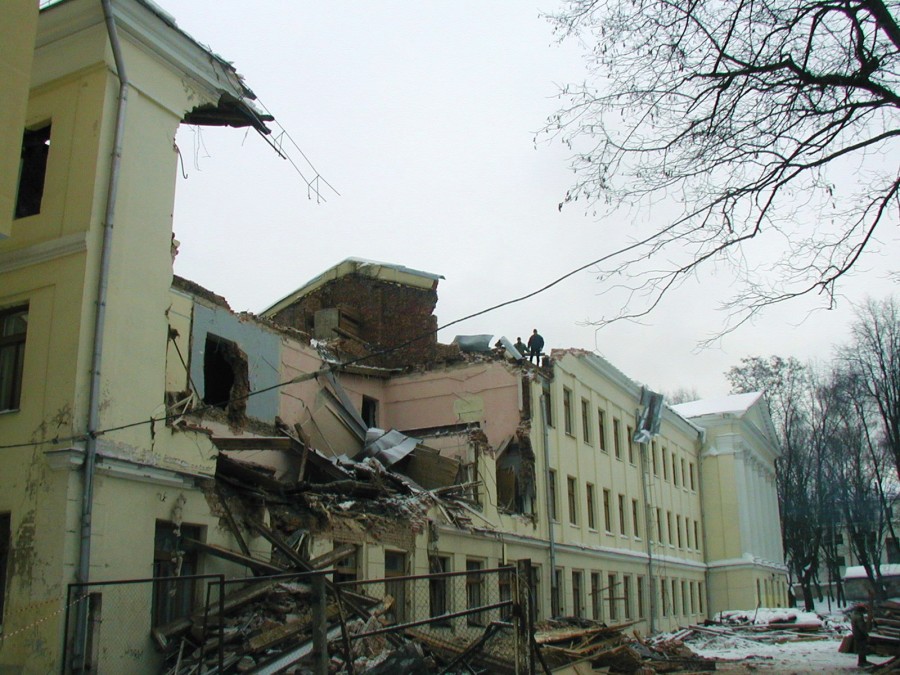The work of the honored teacher and artist Sergey Petrovich Katkov occupies an honorable place in the visual arts of Belarus. His canvases are in the National Art Museum of Belarus, the funds of the Belarusian Union of Artists, the Ministry of Culture of Russia, some of them were purchased by collectors from Belarus, Russia, the USA, Japan and other countries. Many works of the creator were included in encyclopedias and textbooks on Belarusian art.
S. Katkov was born in the village of Skripitsina of the Kalishley district of the Penza region (Russia) in a peasant family. Graduated from the Penza Art and Pedagogical College (1931). His teacher was a pupil of I. Repin, the famous Russian artist I. Horushkin-Sarakapudov. In 1937, S. Katkov came to Belarus, where he lived all his life. In 1937–1971 he is an artist-pedagogue and head of the art studio at the Minsk Palace of Pioneers and Schoolchildren. He taught at the Minsk School of Art (1956–1968), the Republican Boarding School of Art (1963–1965). Since 1938, he has been a participant in art exhibitions. In 1946, S. Katkov was admitted to the Belarusian Union of Artists. He always took an active part in the affairs of the organization: he was a member of the board, headed the art councils, helped to organize work in regional branches.
Siarhei Katkov worked in easel painting in the genres of landscape and still life. Landscape – lyrical, epic, urban, industrial – was dominant in his work. The artist's legacy includes more than 200 canvases, about 300 graphic works. The most famous paintings are "Autumn Landscape" (1947), "On the River" (1959), "Lepel Lakes" (1961), "City Landscape" (1967), "The Tale of Berezina" (1970), "Summer. Still Life" (1971), "Albuti Farm" (1972), "On Pripyat" (1973), "Paleski Giants" and "On Berezina" (both 1975). Sergey Katkov is closer to monumental images of the central region of Belarus than to industrial landscapes, which he paid a lot of attention to in the 1950s. The artist tried to give the paintings dedicated to Minsk the role of an artistic document that is highly informative about the city's multifaceted life.
The source of inspiration for S. Katkov has always been nature, which attracted him with its diversity. Summer landscapes occupy a particularly important place in the artist's work. Their plots are a city, a village, a forest, a park, a lake, a river ("On Soot" (1961), "Morning" (1971), "Forest Edge" (1975), etc.). Every year, S. Katkov sang a generous, wonderful couple, the images were multifaceted, expressive. His works lack meticulous detailing, but at the same time there is no sense of incompleteness. Each of the paintings complements the previous and subsequent ones, which builds a chain of harmony of the sound of lines, colors, plots, moods, and emotions. The tendency to skilfully combine elements of landscape and still life can be seen in the late works of the master "Good Catch" (1969) and "Good Day, Belarus" (1971). In the latter, the artist made an attempt to create a generalized image of his native land, which he affectionately called "forest beauty".
Graphic drawings from frontline life (1943–1944) occupy a special place in S. Katkov's work. The main genres of such sketches were portraits or everyday scenes from the life of soldiers, partisans: difficult roads of war, dugouts, marching columns, liberated cities and villages... The value of "military" works cannot be overestimated: they represent documents-testimonies of a participant in those terrible events. The drawings were exhibited for the first time back in 1944 at an exhibition in Kaunas. The album "Front sketches of Katkov" is kept in the Museum of the Soviet Army in Moscow.
Siarhei Katkov carried out a great deal of work on the organization of exhibitions of children's art. I dreamed about a museum of children's drawings. Spent a lot of effort to develop its concept, but it was not possible to implement the plan. Now his students and friends take care of the realization of the teacher's dream. In 2006, in A memorial to children who died in the Great Patriotic War and from the Chernobyl disaster was erected on Krasny Berag in the Zhlobin district of the Gomel region (one of the authors was L. Levin, a student of S. Katkov). The artistic concept of the complex in one of the parts provided for a space with easels, on which children's drawings are symbolically placed - modest dreams of happiness and beauty. Among other things, the works of S. Katkov's students, once collected and preserved by him, served as material.
A patient and attentive teacher, S. Katkov raised a whole galaxy of Belarusian painters. Among his students are U. Stalmashonak, M. Danzig, N. Shchasnaya, L. Shchamyalev, V. Sumarov, and Z. Litvinova. Siarhei Katkov became the founder of a family dynasty: his daughter Svyatlana Katkova and granddaughter Zoya Lutsevich are now also famous authors, known both at home and abroad.
Descendants of S. Katkov make great efforts to show society the highest professional level of this distinctive, unique artist. His work is being discovered by painting lovers in a new way thanks to exhibitions that are successfully held in different cities every year. In January 2010, the exhibition of S. Katkov's works "Smiling Landscape" opened in the exhibition hall of the National Historical Museum of the Republic of Belarus in Minsk.






















Sasha-Velichko-(1)-thumb.jpg?alt=media&token=53e8f1c7-85c7-41a9-bce4-f1cd3dd6d28c)

















